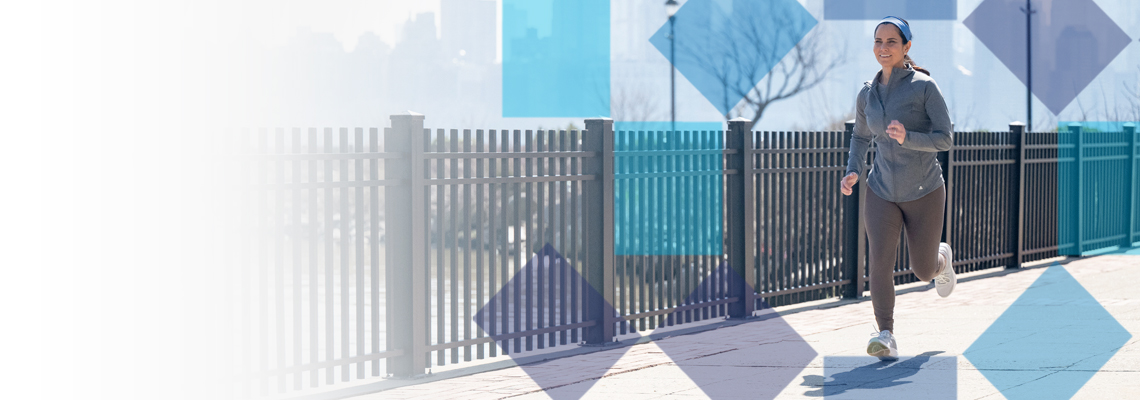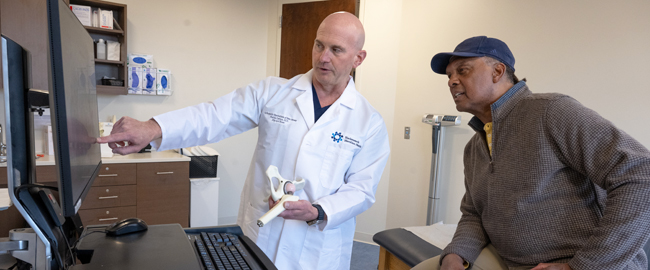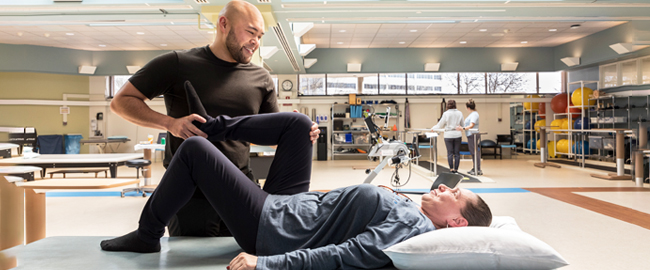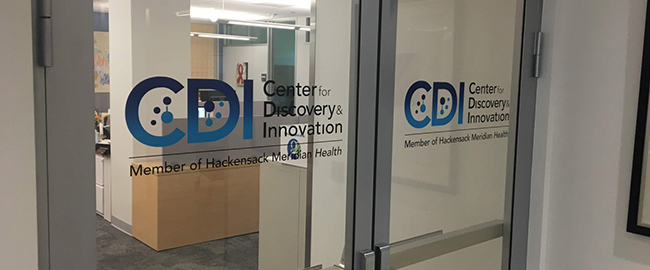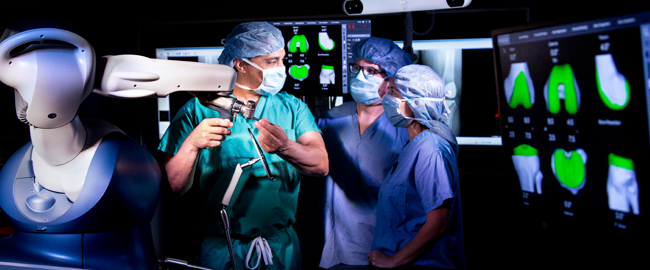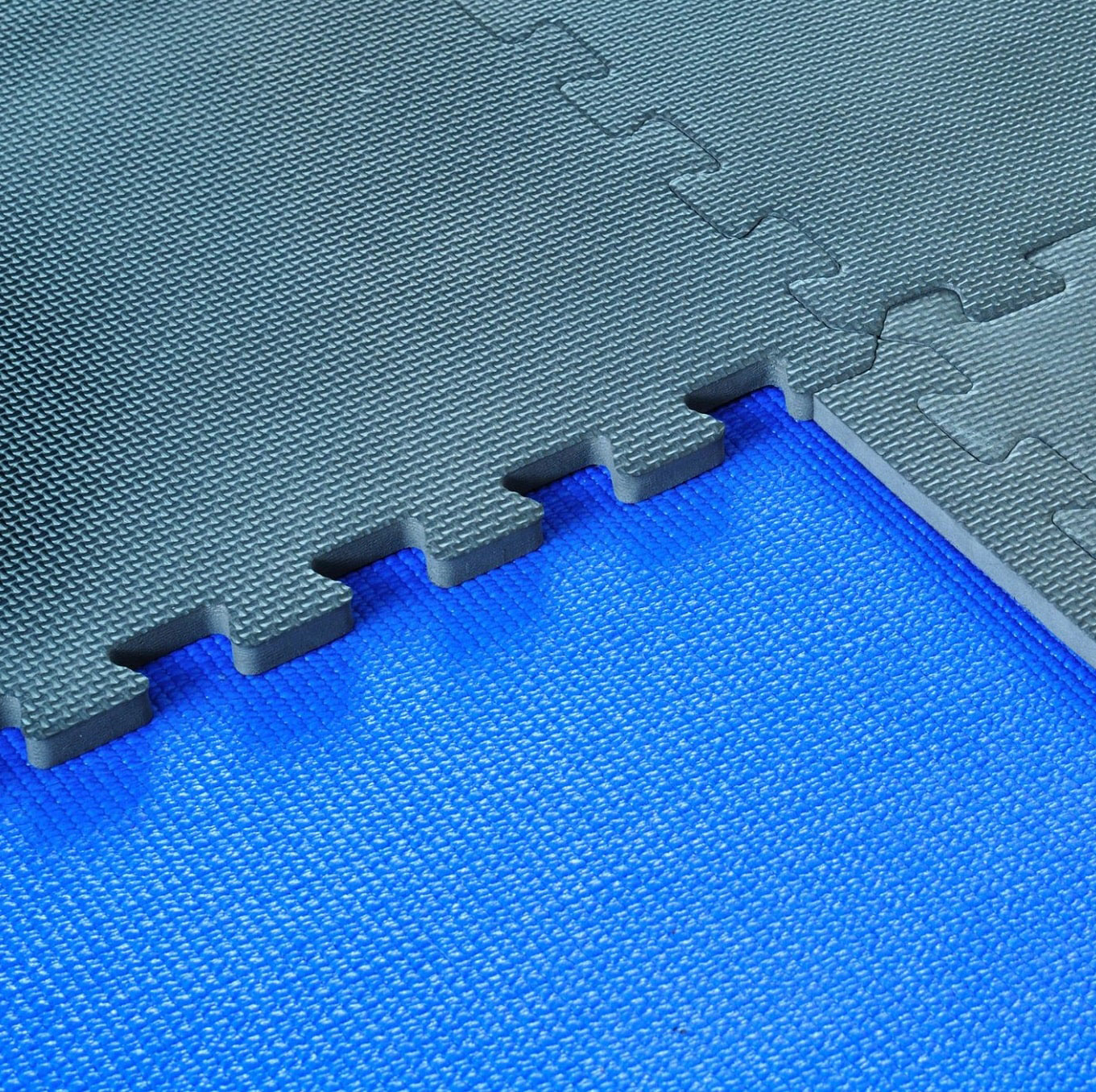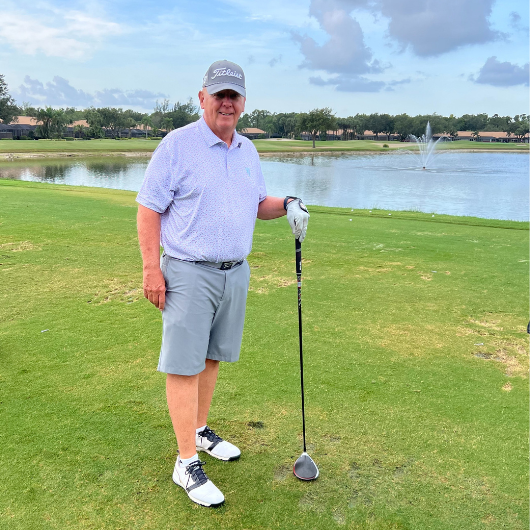Sports Medicine and Injury Care in New Jersey
At Hackensack Meridian Health, our Sports Medicine program offers a full spectrum of services designed to meet the diverse needs of athletes and active individuals. With convenient locations across New Jersey, we ensure that expert sports medicine care is always within reach, whether you’re recovering from an athletic injury or looking to optimize your performance.
Our team of experts specializes in treating a wide range of sports-related conditions as part of our comprehensive orthopedics services, including muscle and tendon tears and injuries, cartilage injuries, fractures, ligament injuries, degenerative joint disease and more. We emphasize a multidisciplinary approach, collaborating with specialists in orthopedic surgery, sports medicine, physiatry, and physical therapy to develop personalized treatment plans.
Our services encompass non-surgical options, minimally invasive procedures, and surgical interventions, all aimed at facilitating a safe return to activity and enhancing athletic performance.
Sports Physicals
We offer a variety of convenient locations across New Jersey providing easy access to sports physicals and pre-participation physical examinations (PPE). Our network of experienced sports medicine physicians ensures thorough evaluations to support athlete health, injury prevention, and peak performance.
Sports Injuries We Treat
- Rotator cuff injuries
- Shoulder instability
- Shoulder dislocations
- Impingement
- Elbow arthritis
- Ligament reconstructions
- Arthroscopy
- Hip arthritis
- Impingement
- Labral tears
- Hip operations
- Patella or kneecap instability
- Meniscus tears
- ACL injuries
- Runner's knee
- Patellofemoral stabilization
- Achilles tendon tears
- Ankle sprains
- Stress fractures
- Other musculoskeletal foot and ankle injuries
- Strains
- Sprains
- Tendinitis
- Fractures
- Sports concussions
- Arthritis
- Achilles tendon tear/injury
- Arm/elbow/shoulder pain
- Back pain
- Buttocks (gluteus) injury
- Calf muscle tear/injury
- Foot/ankle pain
- Groin pain
- Hamstring tear/injury
- Hand/wrist pain
Our Sports Injury Treatment Options
At Hackensack Meridian Health, our expert sports medicine physicians specialize in comprehensive and cutting-edge athletic injury treatment. We offer a wide range of non-surgical and minimally invasive treatment options. We are dedicated to helping athletes of all types recover quickly and safely.
These treatments attempt to utilize our body's innate healing potential by using cells/growth factors to help facilitate healing and improve pain. Conditions that may benefit include degenerative arthritis, acute and chronic tendon injuries, as well as ligamentous sprains.
- Platelet Rich Plasma (PRP): injections of your own blood help rebuild damaged tissue and treat joint pain after an acute sports injury, such as ligament and muscle injuries, tennis elbow and golfer's elbow.
- Bone Marrow Aspirate (BMAC): use your body’s natural ability to heal itself by using regenerative cells from your bone marrow to accelerate healing in osteoarthritis or tendon injuries.
Tendon-related pain secondary to overuse and or physiologic degeneration can be debilitating for many. Conditions such as tennis/golfer's elbow, gluteal/patella/achilles tendinosis, or calcific tendinitis are examples of conditions treated with these minimally invasive treatments.
- Tenex/Percutaneous Tenotomy under Ultrasound Guidance uses ultrasound imaging to guide a tiny needle-like instrument that delivers ultrasonic energy to break down and remove damaged tendon tissue
- Shockwave treatment utilizes high-energy sound waves to stimulate biological responses, including increased blood flow, reduced inflammation, and tissue regeneration, ultimately aiming to alleviate pain and promote healing in damaged tissues.
These treatments are commonly performed to help improve pain and function in patients who may not be ready for surgery or may not be optimal surgical candidates. The addition of ultrasound can help improve accuracy and decrease pain compared to injections.
- Corticosteroid and Hyaluronic Acid Injections, when used in combination with rehabilitation therapy, can significantly reduce the need for surgery.
- Radiofrequency Ablation (RFA) employs a precisely placed needle, often guided by X-ray or ultrasound, to deliver radiofrequency energy to targeted nerve endings. This thermal energy creates a lesion, disrupting the nerve's ability to transmit pain signals to the brain. It can be utilized for chronic low back pain as well as chronic joint pain.
- Cryoneurolysis (Iovera) uses a handheld device to deliver controlled doses of cold to targeted peripheral nerves around the knee. This cold therapy temporarily freezes the nerve tissue, interrupting its ability to transmit pain signals. This can be used prior to a total knee replacement to help with postoperative pain management or for chronic knee pain.
- Epidural Steroid injections are used to treat radiculopathy (sciatica) by reducing inflammation and pain caused by irritated or compressed spinal nerve roots. The procedure is typically performed by fluoroscopically guided injection of a corticosteroid and a local anesthetic into the epidural space near the affected nerves.
- Nerve blocks/Medial branch radiofrequency ablation (RFA) is a technique that uses heat generated by radiofrequency waves to destroy medial branch nerves, which transmit pain signals from facet joints in the spine. This procedure is commonly performed for chronic neck or lower back pain caused by facet joint arthritis
- Sacroiliac Joint Treatments include image guided joint and periarticular corticosteroid injections for pain. For patients suffering from chronic sacroiliac joint related pains, physicians can precisely inject the joint with anesthetic or steroid to help alleviate pain. This is typically conducted utilizing live x-ray or at times ultrasound.
- Physical Therapy focuses on restoring mobility, and improving strength through techniques like exercises, manual therapy, and modalities such as heat or cold therapy.
- Occupational Therapy focuses on improving pain and restoring independence by using interventions such as therapeutic exercises, ergonomic education, adaptive equipment, and training in activities of daily living (ADLs).
- Osteopathic Medical Manipulation and Chiropractic Manipulation both focus on joint mobilization techniques.
- Acupuncture stimulates the release of endorphins and anti-inflammatory pathways that help suppress pain transmission.
Arthroscopic Surgery: This minimally invasive technique uses small incisions and a camera to visualize and repair problems within joints. Examples include shoulder and knee arthroscopy for conditions like rotator cuff tears, meniscus tears, and labral tears.
BEAR: A surgical technique that uses an implant to help a patient's own torn ACL heal, rather than replacing it. This approach allows patients to keep their native ligament - avoiding the bone tunnels and graft harvesting required in traditional reconstruction - which is especially beneficial for young patients.
Ligament Reconstruction: Ligaments provide stability to joints, and surgery is often needed to repair torn or damaged ligaments. ACL reconstruction is a common procedure to repair the anterior cruciate ligament in the knee.
Joint Replacement: This surgery replaces damaged joints with artificial implants, often for severe arthritis or injuries. Examples include hip, knee, and shoulder replacements.
Rotator Cuff Repair: This surgery repairs tears in the rotator cuff muscles and tendons of the shoulder, which can cause pain and limited range of motion.
Meniscus Repair: Meniscus tears in the knee can be repaired or, if the tear is severe, the damaged part of the meniscus may be removed (meniscectomy).
SLAP Repair: This surgery repairs tears in the superior labrum of the shoulder joint, which can cause pain and instability.
Tommy John Surgery: This procedure reconstructs the ulnar collateral ligament in the elbow, which is often injured in throwing athletes.
Treatment for Concussions in New Jersey
Our state of the art, multimodal collaborative approach to concussion care integrates the expertise of various healthcare professionals to provide comprehensive, individualized treatment for patients at all levels:
- Sports medicine physicians often serve as the initial point of contact, coordinating care and monitoring recovery progress.
- Neurologists contribute specialized knowledge in brain function to evaluate and manage complex neurological symptoms.
- Vestibular therapists address balance and dizziness issues through targeted rehabilitation, while neuropsychologists assess cognitive function and emotional well-being, guiding return-to-learn or return-to-play decisions.
- Physical therapists play a crucial role in managing headaches, neck pain, and exertional tolerance through tailored exercise programs.
Find a Sports Medicine Specialist or Care Location
Search our network of sports medicine and injury specialists or browse our sports medicine and injury care locations across New Jersey.
Cutting-Edge Sports Medicine Research
Our affiliation with the Hackensack Meridian Center for Discovery & Innovation ensures that patients benefit from cutting-edge research and advanced orthopedic care. Whether you're a professional athlete or someone who enjoys staying active in your free time, our comprehensive sports medicine services are designed to support your health and athletic goals. Learn more about why you should choose Hackensack Meridian Health for your sports medicine and sports injury care.

